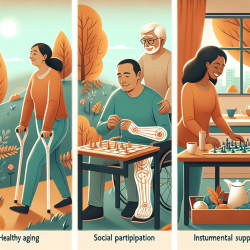In the realm of online therapy, practitioners are constantly seeking effective methods to enhance the well-being of their clients. A recent scoping review titled "Nutrition, Sleep, and Exercise as Healthy Behaviors in Schizotypy: A Scoping Review" offers valuable insights that can be applied to therapy practices, particularly for individuals with schizotypal traits. This blog explores the findings of the review and how therapists can integrate these healthy behaviors into their practice to foster better mental health outcomes.
The Importance of Nutrition, Sleep, and Exercise
The scoping review by Wong, Raine, and Dinzeo (2022) emphasizes the significance of three key healthy behaviors—nutrition, sleep, and exercise—in managing schizotypal traits. These behaviors are crucial not only for physical health but also for mental well-being, especially for individuals exhibiting schizotypal personality traits, which can be precursors to more severe conditions like schizophrenia.
Nutrition
Proper nutrition plays a vital role in mental health. The review highlights studies that show the benefits of omega-3 polyunsaturated fatty acids (PUFAs) in reducing symptoms and improving global functioning in individuals at high risk for psychosis. For instance, a study by Amminger et al. (2010) demonstrated that omega-3 PUFA supplements significantly reduced the progression to psychosis in adolescents. Practitioners can encourage clients to adopt a diet rich in omega-3 fatty acids, such as fish, flaxseeds, and walnuts, to potentially mitigate schizotypal symptoms.
Exercise
Physical activity is another cornerstone of mental health. The review found that regular exercise can lead to sustained behavioral changes and improved quality of life. For example, Beebe et al. (2011) showed that a walking intervention program increased physical activity and engagement in individuals with schizophrenia spectrum disorders. Therapists can motivate clients to incorporate regular physical activity into their routines, emphasizing the mental health benefits of even low-intensity exercises like walking.
Sleep
Quality sleep is essential for cognitive and emotional regulation. The review points out that poor sleep is associated with higher levels of schizotypal traits. Studies included in the review indicate that improving sleep hygiene can reduce schizotypal symptoms. Therapists can work with clients to establish healthy sleep habits, such as maintaining a consistent sleep schedule, creating a restful sleep environment, and managing stress and anxiety before bedtime.
Implementing Healthy Behaviors in Therapy
Therapists can integrate the findings from the scoping review into their practice by:
- Encouraging clients to maintain a balanced diet rich in essential nutrients.
- Promoting regular physical activity tailored to the client's abilities and interests.
- Helping clients develop and maintain good sleep hygiene practices.
- Providing psychoeducation on the benefits of these healthy behaviors for mental health.
- Collaborating with clients to set realistic and achievable health goals.
Encouraging Further Research
While the review provides valuable insights, it also highlights the need for more research on the intersection of nutrition, sleep, and exercise in relation to schizotypy. Practitioners are encouraged to stay informed about ongoing research and consider participating in studies to contribute to the growing body of knowledge in this area.
Conclusion
Incorporating healthy behaviors such as proper nutrition, regular exercise, and quality sleep into therapy can significantly enhance mental health outcomes for individuals with schizotypal traits. By applying the findings from the scoping review, therapists can better support their clients in achieving overall well-being.To read the original research paper, please follow this link:
Nutrition, Sleep, and Exercise as Healthy Behaviors in Schizotypy: A Scoping Review.










